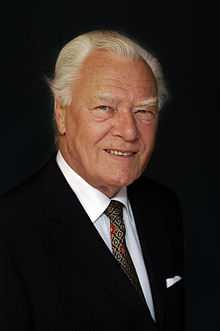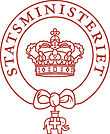Poul Schlüter
| Poul Schlüter | |
|---|---|
 | |
| Schlüter in 2005 | |
| Prime Minister of Denmark | |
| In office 10 September 1982 – 25 January 1993 | |
| Monarch | Margrethe II |
| Preceded by | Anker Jørgensen |
| Succeeded by | Poul Nyrup Rasmussen |
| Justice Minister of Denmark | |
| In office 3 October 1989 – 5 October 1989 | |
| Preceded by | Hans Peter Clausen |
| Succeeded by | Hans Engell |
| Leader of the Conservative People's Party | |
| In office 1974–1993 | |
| Preceded by | Erik Ninn-Hansen |
| Succeeded by | Henning Dyremose |
| Personal details | |
| Born | 3 April 1929 Tønder, Denmark |
| Political party | Conservative People's Party |
| Religion | Church of Denmark |
Poul Holmskov Schlüter (Danish pronunciation: [pʌʊ̯l hʌlmsɡʌʊ̯ slydɐ], 3 April 1929) is a Danish politician, who served as Prime Minister of Denmark from 1982 to 1993.[1][2][3] He was the first member of the Conservative People's Party to become Prime Minister, as well as the first conservative to hold the office since 1901.
Early life and career
Born in Tønder, south Jutland, he graduated from the University of Copenhagen in 1957 with a degree in law, and joined the bar in 1960. Schlüter was a member of the Folketing (Danish parliament) for the Conservative People's Party from 1964 to 1994. He was also Chairman of the Conservative People's Party from 1974 to 1977 and from 1981 to 1993.
Prime Minister

In 1982, after Prime Minister Anker Jørgensen was forced to resign, Schlüter cobbled together a four-party coalition and was appointed his successor. During his time as Prime Minister, he was named "Nordic Politician of the Year" (in 1984). He has since been granted a large number of Danish and international awards and medals.
Previously, he had served as a member of the Council of Europe from 1971 to 1974, and had headed the Danish Delegation to the Nordic Council, where he served as a member of the Council Presidium, in 1978 and 1979. He retired as Prime Minister in 1993 after an inquiry found that he had misinformed the Danish Parliament. The case was known as the Tamil Case (Danish: Tamilsagen), as it involved asylum requests from Tamil refugees.[4]
Later life
Following his retirement as Prime Minister in 1993, Schlüter served as a member of the European Parliament from 1994 to 1999, the first three years as Vice-President of the body.
In 2003, Schlüter was appointed by the Swedish Minister of Co-operation as her special envoy to promote freedom of movement in the Nordic countries. Poul Schlüter was to work on ways of increasing individual freedom of movement and present specific proposals to the Nordic Council Session in October 2003.
In 2004, Poul Schlüter co-founded the first Danish free-market think tank CEPOS, and gave the opening speech at CEPOS' opening reception at the Hotel D'Angleterre in Copenhagen.[5]
Bibliography
- Schlüter, Poul (1999). Sikken et liv [What a Life]. autobiography (in Danish) (Aschehoug). ISBN 8711113197.
References
- ↑ Poul Schlüter Den Store Danske, Gyldendals åbne encyclopædi
- ↑ "DECISION FOR EUROPE; Danes Will Vote Again on Europe, But Treaty May See Some Changes". The New York Times. 23 September 1992. Retrieved 17 September 2011.
- ↑ "EU gravy train must run to new timetable". The Independent. UK. 8 November 1996. Retrieved 17 September 2011.
- ↑ Thi kendes for ret. Dokument. Rigsrettens dom over forhenværende justitsminister Erik Ninn- Hansen afsagt 22. juni 1995. Weekendavisen, 23.06.1995, 1._sektion, Side 3
- ↑ "Poul Schlüter". Biography (in Danish). CEPOS. Retrieved 9 September 2012.
External links
| Wikiquote has quotations related to: Poul Schlüter |
| Wikimedia Commons has media related to Poul Schlüter. |
- Regeringen Poul Schlüter I (First Government of Poul Schlüter) — Statsministeriet (Prime Minister's Office)
- Regeringen Poul Schlüter II (Second Government of Poul Schlüter) — Statsministeriet
- Regeringen Poul Schlüter III (Third Government of Poul Schlüter) — Statsministeriet
- Regeringen Poul Schlüter VI (Fourth Government of Poul Schlüter) — Statsministeriet
| ||||||||||
